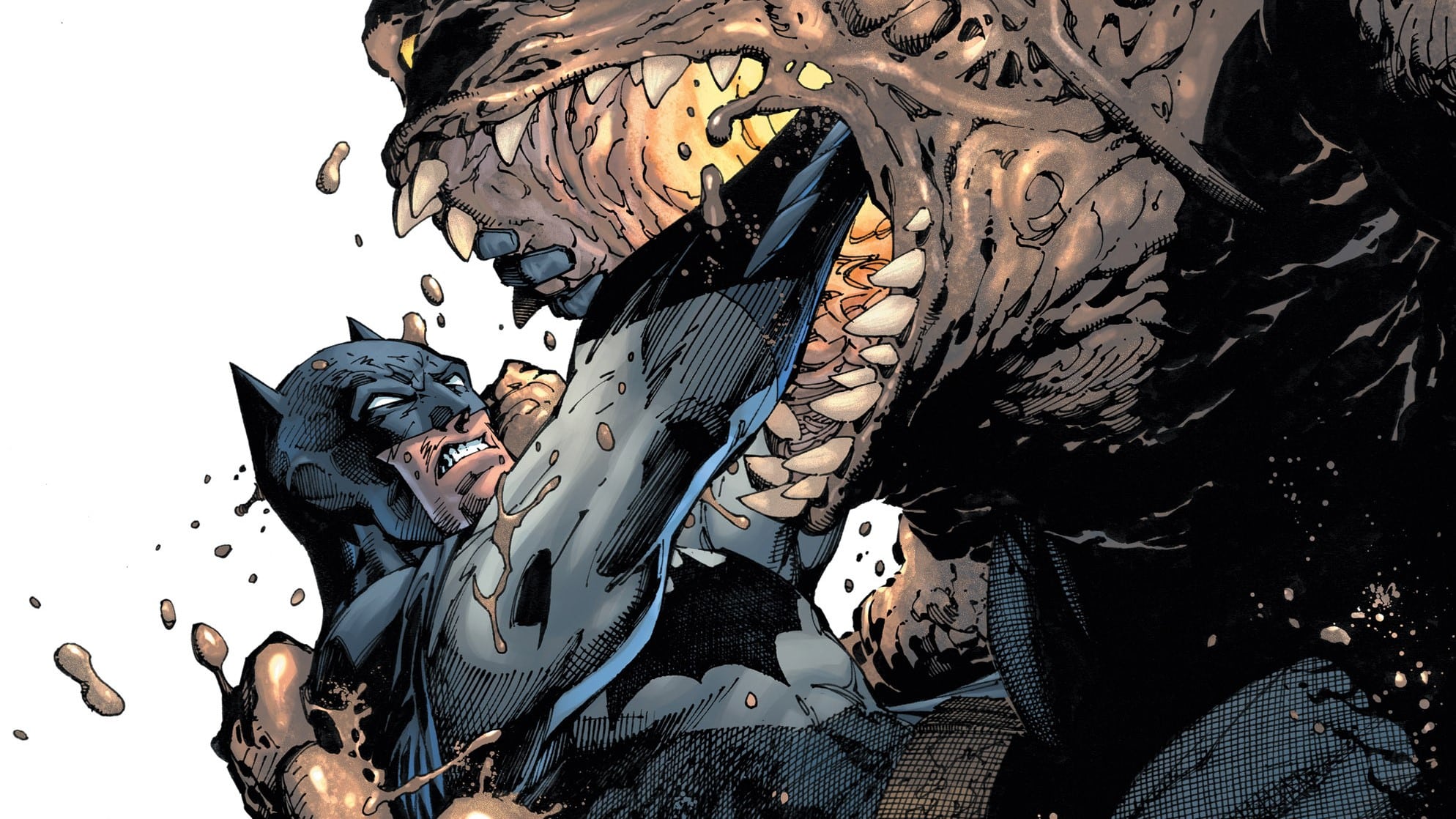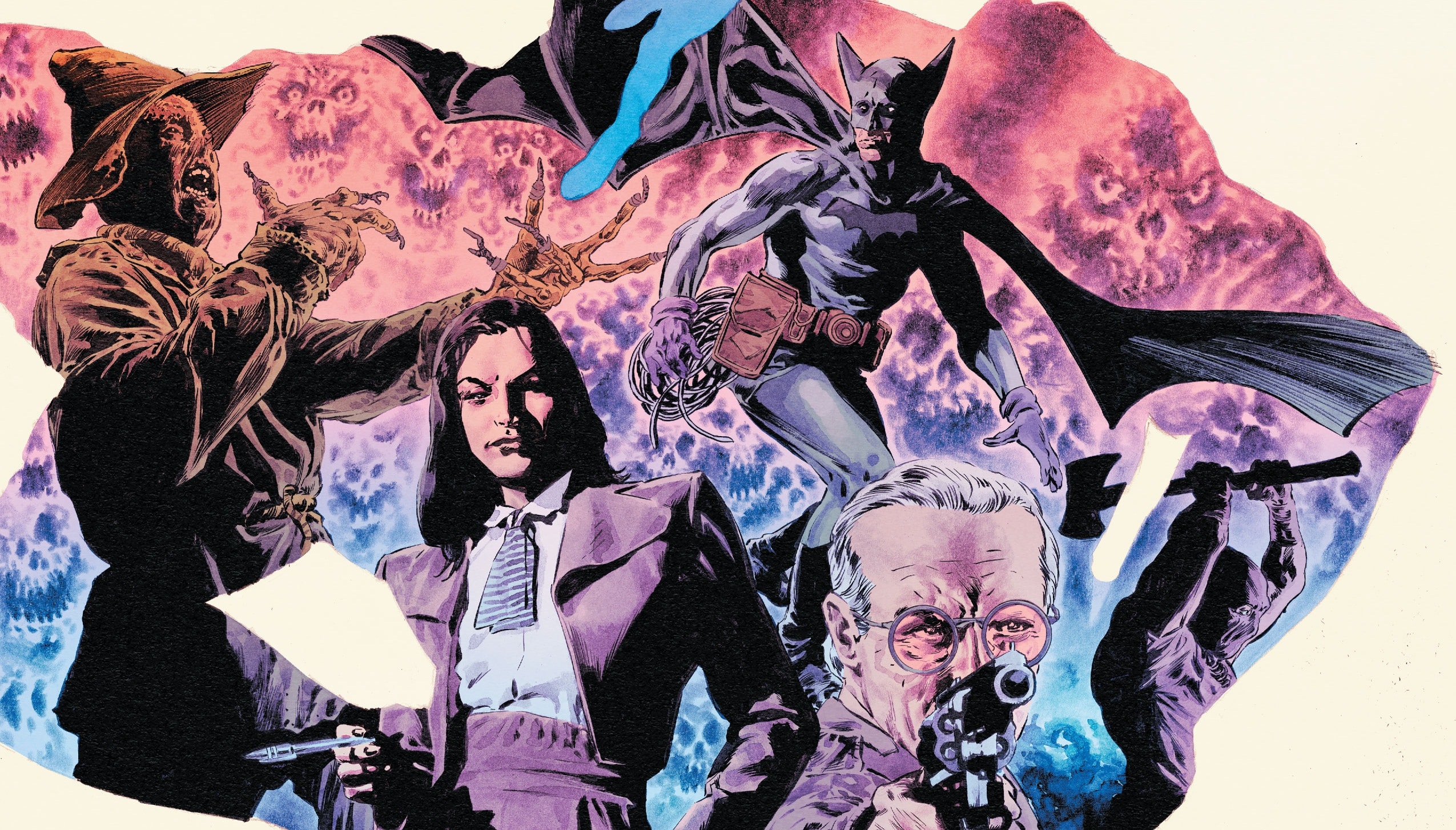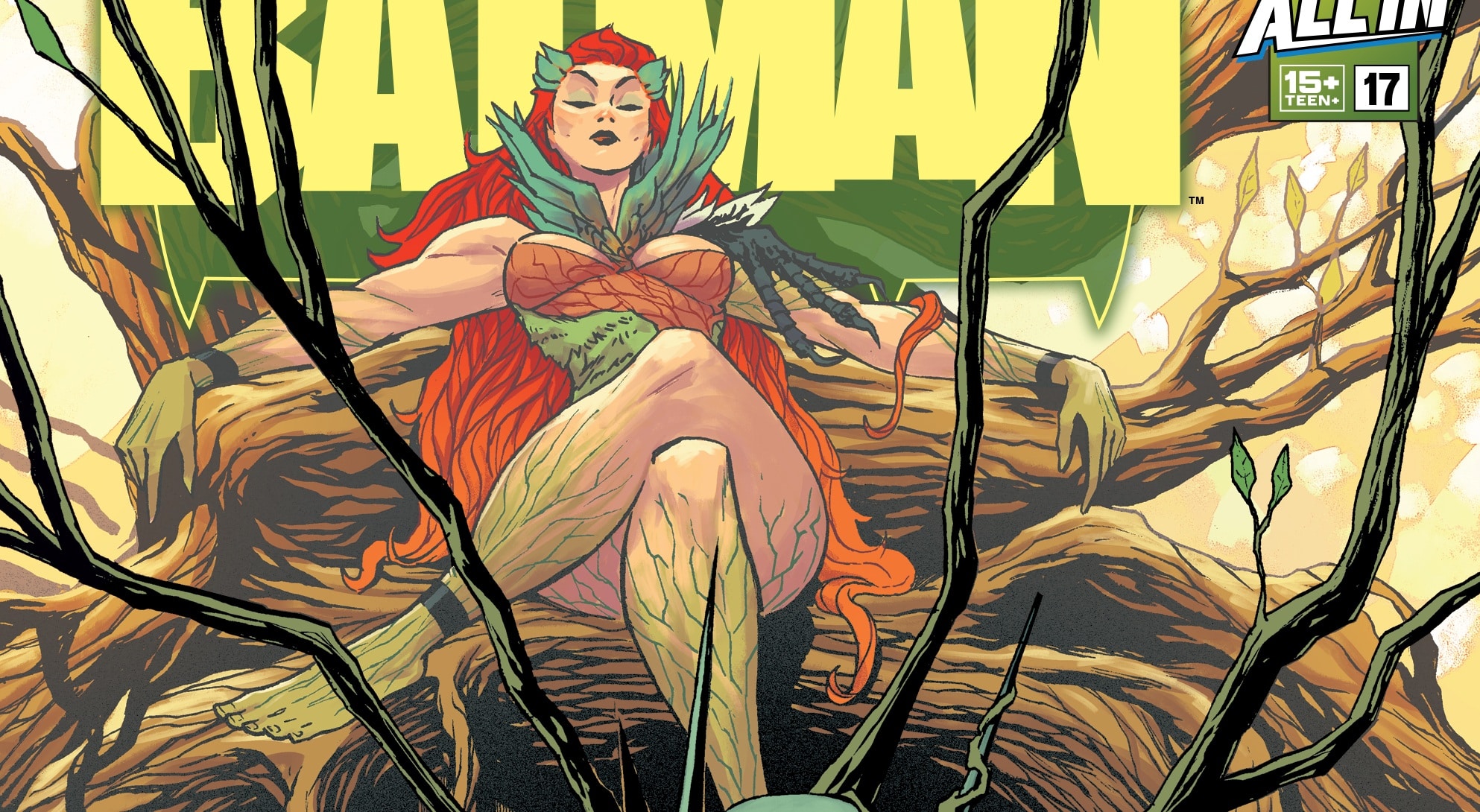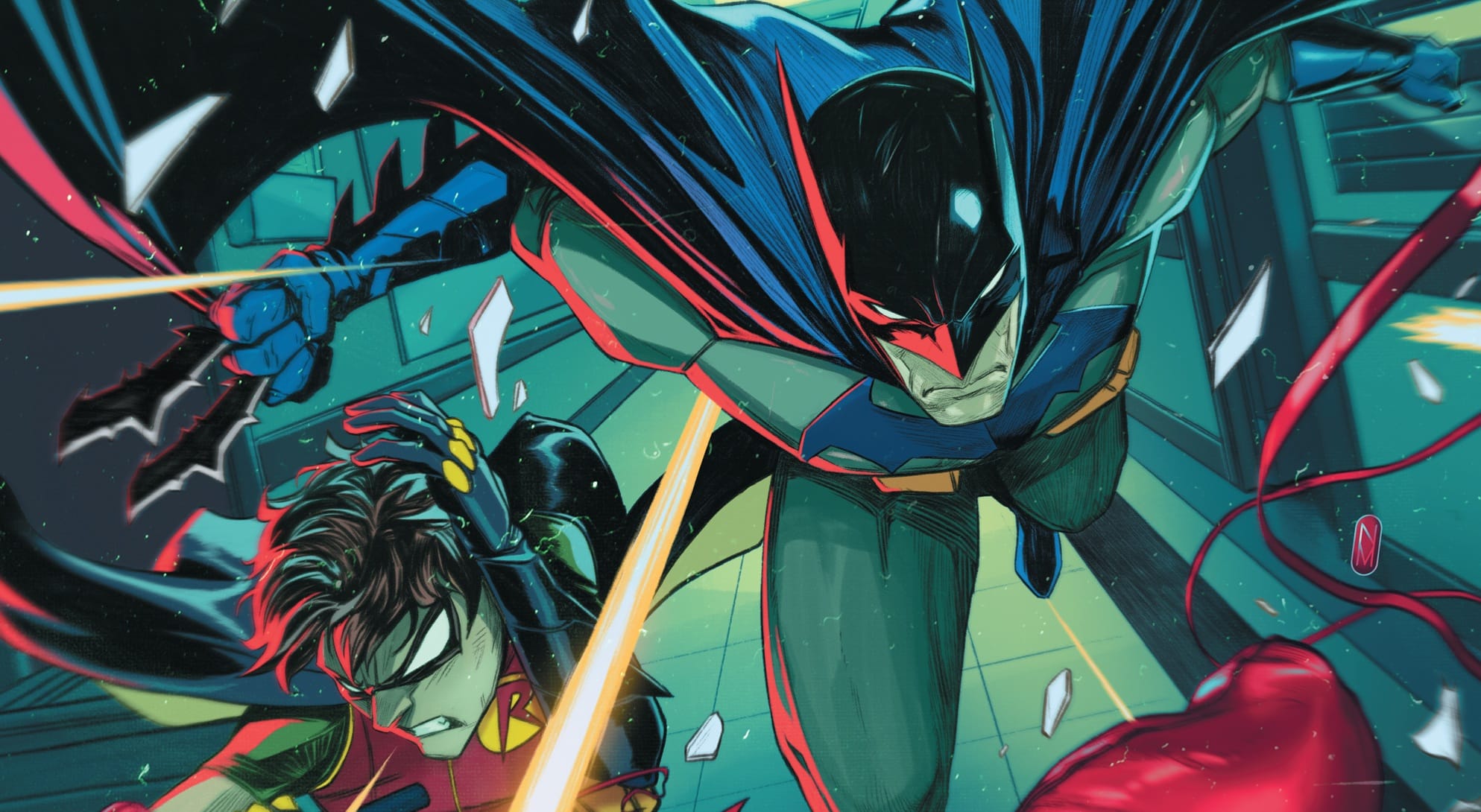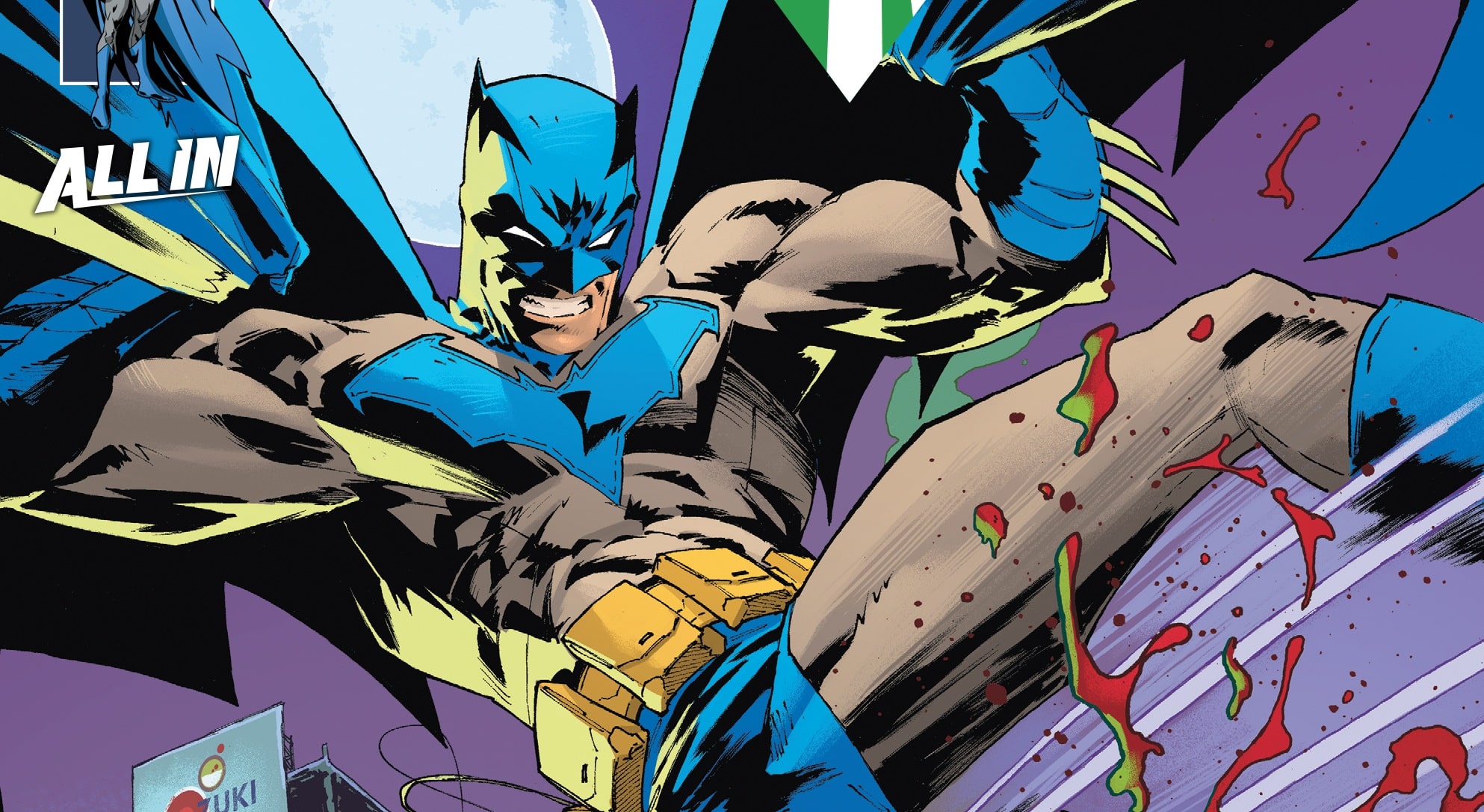Danny Ortega’s one-man war on the GCPD continues as Renee Montoya is given an offer in GCPD: The Blue Wall #5, written by John Ridley, drawn by Stefano Raffaele, colored by Brad Anderson and lettered by Ariana Maher.
Basil Karlo went to Hollywood to reinvent himself. But when you’re a shapeshifting clay monster, it’s hard not to solve every problem in a certain way, even if it means throwing away everything you’ve built. Batman: One Bad Day: Clayface is written by Collin Kelly and Jackson Lanzing, drawn by Xermánico, colored by Romulo Fajardo Jr. and lettered by Tom Napolitano.
The demon Neron wants what is his. In this case, that’s the soul of Blockbuster’s daughter, who is under Nightwing’s protection. So it’s Titans, shapeshifters and foreign kings in Nightwing #101, written by Tom Taylor; drawn by Travis Moore, colored by Adriano Lucas and lettered by Wes Abbott.
Matt Lazorwitz: For a column about Batman comics, there’s not a lot of Batman this week.
Will Nevin: We got, like, what, four or five pages? Maybe we should have gone back and reviewed Beyond the White Knight instead.
Matt: … No. No, I’d rather not.
Will: Well aren’t you a regular Bartleby: The Scrivener?
A Shot Before Dying

Matt: Last issue I said I was surprised that Danny Ortega didn’t go after the officers who persecuted him. Famous last words. At least for them, huh?
Will: No one with a badge — or even connected to someone with a badge — is safe, it seems. It still doesn’t seem like an earned turn. But this is rounding into a nice little thriller … even as I’m begging John Ridley to never use “SJW” in a comic again.
Matt: Oh, I knew that one was going to bug you!
Will: It’s not that the politics of it bother me — I think Ridley and I would agree on most things, or at least I hope we would — it’s that I don’t think anyone in that situation would actually talk that way. Like people in the DC universe making a Killing Joke movie (we’ll get to that shortly!), it takes me right out of the story.
Matt: And that’s why I knew it would bug you; you have very specific tells when it comes to language, and we have been doing this long enough that I can generally pick them up.
While there are some things about this that I think are rushed, the stuff with Montoya here is excellent. Watching her deal with the guilt of her brother’s death, the responsibility she feels for it and the fact that she honestly could have done more to stop it makes for a heady mix, and the end of the issue sees Renee going to a dark place. Especially dark because it’s one drink. That is a conscious decision. This isn’t an alcoholic having a slip; this is a person who has decided that all the progress they have made fighting their demons isn’t worth it, so fuck it, might as well take a shot while the ship sinks. It’s chilling. Not in the horror movie sense, but in the tragedy sense.
Will: That was the same read I had on the scene as well — powerful and tragic. But Montoya has been put through the goddamned ringer in the past few issues, and now Harvey has popped up offering to do her a kindness — albeit one that is incredibly dark in his offer to murder Danny. I guess the story plays out one of two ways: She takes his offer, perpetuating the corrupt system that Danny is trying to fight, or rejects it and says that Gotham has to be better.
Matt: We’ve been reading stuff for the pod about what Gotham is as a city and what it does to people, so I hope it’s the latter. This is a story about broken and corrupt systems (We’ll get to a very different broken system shortly as well), and each of the rookies we started with have been broken by it very quickly. Montoya has another great line talking to Chief Davis, about the “old white boys club.” That not only, as he posits, that they all become old white boys, but, “Worse than that. We let it happen to us.” When Ridley hits the right notes? They hit hard.
Will: The man knows characters and stories — no doubt there.
Matt: How do you feel about getting inside Danny’s journal/manifesto? I kind of feel that would be a more powerful device if we didn’t see what he actually said, and just saw Renee react to it. It’s hard to find the proper balance between valid points and the stuff that is the product of someone who has clearly lost touch with some aspect of reality. Or is the question has Danny lost touch with reality at all? Is this a Joker “One bad day” scenario, done in a more natural way than we’re seeing in other places, and Danny’s break just made him decide to stop playing the game and just … deal with his problem with a gun? I’m not condoning his killings, but is the method the problem far more than the message? I think Ridley wants us to agree with that, but I don’t know if I needed to read the message on the page, when the actions of others prove it out.
Will: It’s a struggle between showing the things that happened to him while also demonstrating that his actions are not those of a sane man — we can’t do Punisher vs. the GCPD here. This has to be grounded in some moral truth. That was one of our complaints last time, that Danny immediately went to killing “civilians” rather than crooked, racist cops. If I had my way, the manifesto would be something like we see in The Shining — a thing clearly the product of madness.
Matt: But by doing that, you would run the risk of invalidating all the points he makes to some people. And he is very right to a point. It’s when he gets beyond that point that things go bad. Of course the people who would not see his point if he broke fully are probably the kind of people who wouldn’t listen to him regardless of what point he was making or how he made it, like the officers he executed this issue.
Will: I think if he’s more clearly not well, you have a more sympathetic character on your hands. But maybe we don’t want that here. Side note: Do you think Batman shows up at the end of this story?
Matt: My money is on no. I think the next issue is Renee vs. Ortega all the way, and the fallout thereof.
Dying Is Easy, Acting Is Hard

Matt: It’s time to play our favorite game: Rank the One Bad Day one-shots!
Will: Ooooooh, I hate this game! I know that Tom King’s Riddler book is all the way at the goddamned bottom, sharing space in my brain with other things like Jeff Lemire’s Robin and Batman. What else have we had? Two-Face, Freeze, Catwoman, Penguin, Bane — did I forget anyone?
Matt: Nope. Clayface is seven, and the final, eighth book is Ra’s next month.
Will: At the end of the tunnel, there is light. OK, from best to worst, here’s my stab at it: Penguin, Freeze, Catwoman, Clayface, Two-Face, Bane, Riddler.
Matt: Yes, I’m about there with you. This is firmly middle of the pack. It tells a story that would only work with Clayface of the rogues, and focuses on what is the core of what these one-shots are supposed to be: the one bad day that screws up a life. That has varied from book to book, with its strongest use still being in the Catwoman special, but here we definitely get the moment that screws up Basil’s life. And I like that it’s not formative, like Selina’s or *sigh* Eddie’s, but it’s screwing up his new life. Not all things that destroy someone’s life happen in childhood.
Will: I liked the core of the story, the idea of an actor making war against the soulless Hollywood system. But I could have 100% done without the Killing Joke reference or meta commentary on it. Hard fuckin’ pass right there.
Matt: Yes, 100%. Every time it referenced Killing Joke, it threw me right out of the story. It was too on the nose. I also blame the Harley Quinn animated series, because I couldn’t read Basil doing a monologue without hearing Alan Tudyk’s over-the-top Clayface from that show.
I also liked Clayface vs. the System as a concept, but how, deep down, it’s as much about the fragility of his own ego as it is about the system. Yes, the casting people were asking for something dumb (which might have been a sly commentary on Todd Phillips’ Joker as well), but in the long run it’s because someone lesser got the gig that Basil really turns, and on a friend no less.
Will: It wasn’t the real actor who got the part, which of course would infuriate Basil. Also, gotta say the “struggling actors as waiters” story must be played out by now, right?
Matt: It’s a trope, sure. I can cut that some slack in a one-shot, because using a trope saves on page space.
The use of Batman here was fun. Him getting into the party Clayface was throwing as Bruce made a lot of sense, and it showed that Bruce really was giving Clayface a chance; I felt like he was watching, and gave him the chance, but when he slipped, he was there. I appreciate a Batman who is truly willing to give the rogues a chance to redeem themselves.
Will: See, I thought Bruce was there by coincidence.
Matt: I subscribe to the theory that, when it comes to Batman, next to nothing is coincidence.
Will: If Bruce knows that Clayface is, indeed, Clay, a struggling actor, he’d have to also know that Clay wouldn’t have the resources to throw that sort of party.
Matt: But Clay didn’t throw the party, the producer did. I think Bruce twigged to Karlo taking the place of his buddy or something, and had been following the evidence to the party. Otherwise, how did he know about all nine victims?
Will: This is making more sense now as the producer’s party and not Clay’s — you’re right on that point. How long did Basil think he would be able to pull this off? Whatever complaints I have with the story, I’ll say this: They nailed that fuckin’ ending.
Matt: I don’t think he was thinking. This felt like a Coen Bros. story, where the perpetrator just keeps digging deeper and deeper, looking for a way out, and it never comes up till the cop is holding a gun on you while you feed your partner into a wood chipper.
Will: Did you just spoil Fargo?
Matt: 27 years is safely out of spoiler territory.
Context Matters

Matt: I think, outside of all-ages comics, Nightwing is probably the lightest comic DC puts out, which was nice after the two pretty dour books above.
Will: This was … uhhh … wild, Matt.
Matt: This might be a little more broadly superhero than what you’re used to reading in Bat titles, huh?
Will: There were creatures, Matt. Beasts who were boys. A dog that at one point could talk but can talk no longer.
Matt: Yeah, you just started at #100. You weren’t here for when Nightwing’s Bat-Mite showed up back in issue #98.
Will: No, but “Bitewing” as a dog’s name is great. No notes.
Matt: And that’s his name when she’s hanging out with Nightwing! When she’s with Dick, she’s Haly, as in the circus.
We seem to be entering a period where Nightwing is balancing his time more between the Bat family and the Titans, and when the Titans are around, the book is going to have a different flavor. The Flash and Raven can’t fight Tony Zucco. Well, they can, but it’s a pretty quick fight. You need threats like body stealing/shape shifting demons to balance out the power sets.
Will: Just like Detective Comics needs a reason to exist, so too does Nightwing. This is probably not my deal, but I can see the need for Dick to cut loose in a zanier sort of environment.
Matt: I think a lot of this is setting up Taylor’s new Titans ongoing. Once the Titans have a new home, this might come back more to the Blüdhaven stuff we were seeing before. I still enjoy this, but this feels more like a different-strokes thing than a problem with the quality of the book, because I think you’d admit this is a well-crafted comic.
Will: Oh yeah, no complaints about the quality. Art was a blast. I just got no clue what’s going on.
Matt: Boy, it sounds like you could have used something to explain the events of previous issues …
Will: Like some sort of page that would briefly retell previous events and catch new readers up to speed? I’m not sure if that technology exists, Matt.
Bat-miscellany
- This week we give everyone a peek behind the BatChat Patreon paywall, in the general release of the episode that is our tribute to Kevin Conroy.
- I can’t picture Garfield Logan, Beast Boy, playing the Grey Ghost as suggested in the Clayface one-shot. Doesn’t seem like his kind of role.
- “The Narrator is driven to help (or attempt to help) by a basic sense of moral responsibility, rather than anything else. The figure of Bartleby demonstrates that morality and ethics no longer play effective roles in the modern world.”

